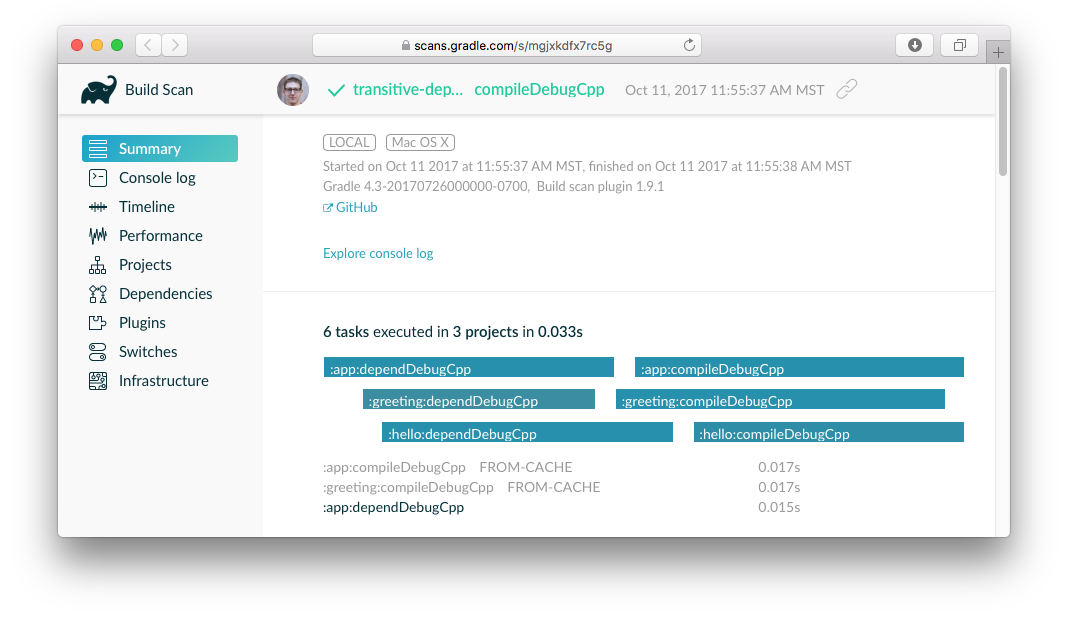
Welcome to the October Newsletter!
Winter is coming (or just ended, perhaps), and the crisp air isn’t the only thing to enjoy this time of year. It’s been an especially active month with lots of new releases, community news, and events. Let’s dive in!
First, we’d like to congratulate the Android SDK Tools team on shipping Android Studio 3.0! Among other things, this brings massive performance improvements to Android Gradle builds through variant-aware dependency management, better parallelism, and use of Gradle’s new build cache. Don’t take our word for it though: see what the Twitter, The New York Times, and other Android teams are saying.
One of the fastest ways to learn how to migrate to 3.0.0 is join us at .droidconSF next week. Hans Dockter, Gradle CEO, is teaming up with César Puerta, Tech Lead for Twitter Android, to talk about Optimizing Android Build Performance. Members of Gradle engineering will be at the Gradle booth offering advice for your builds as well.
You can get $50 off .droidconSF registration using this link.
The Android SDK Tools team aren’t the only ones shipping lots recently. The Gradle team has some exciting updates as well: Gradle Enterprise 2017.6 features finer grained build cache access control, heavily-optimized build scan storage, a more polished build scan UI, and more.
It’s never been easier to get started with Gradle Enterprise as you can now run Gradle Enterprise on Windows, macOS and Linux with no fuss by using the virtual machine image provided when you start a free trial. In addition to the regular interactive Gradle Enterprise training course that we previously offered, we also now provide free access to a pre-recorded version of the training that can be viewed on demand.
There’s been lots of community activity around Java 9 modules this month, so here’s the highlights:
- First, Chainsaw, a fork of Gradle’s experimental-jigsaw plugin, that aims to further improve first-class support of Java 9 modules, with conveniences for module naming, patching, and testing.
- Next up, java9c, a new Gradle plugin that detects package conflicts (aka “split packages”) to ease Java 9 modules adoption.
- The JUnit team has developed a JUnit 5 + Java 9 engine example that demonstrates how to write and register a custom
TestEngineimplementation with Java 9 and Gradle. - Finally, we published our own article about the State of Gradle Java 9 Support that touches on runtime support, cross-compilation, MRJARs, and Jigsaw modules support.
Finally, the Gradle team is proud to announce the availability of Gradle 4.3, which features experimental build cache support for C and C++ compilation, --scan integration, Kotlin DSL v0.12, and much more.
Until next time!
—The Gradle Team
From the Community
You have also been hard at work shipping other awesome plugins and articles!
- Eclipse Oxygen.1a IDE Improvements — What’s new in Eclipse Oxygen .1a for Java 9, JUnit 5, Gradle and more.
- Gradle Day 2017 videos (in German) — Presentations from Gradle Day in Munich on October 10th.
- scana/ok-gradle — A new IntelliJ/Android Studio plugin for searching artifacts ids of popular Java libraries.
- junit5-samples/junit5-java9-engine — Demo project showing how to write and register your own
TestEngineimplementation using Java 9 and Gradle. - jonnyzzz/java9c — New Gradle Plugin to detect package conflicts for migration to Java 9 Modules.
- Ullink/gradle-msbuild-plugin — Plugin for delegating C# builds to MSBuild from Gradle.
- zyxist/chainsaw — A Gradle plugin that adds support for building Java 9 modules.
- asciidoctor/asciidoctor-gradle-plugin — Version 1.5.6 is out with performance improvements and bug fixes.
Have something you’d like to see featured here? Just send us an email with the details to newsletter@gradle.com.
Upcoming Free Training
Gradle Inc. | 2261 Market Street #4081 | San Francisco, CA 94114
Privacy Policy | Unsubscribe



